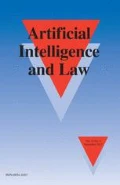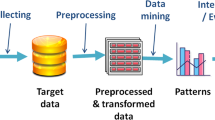Abstract
Legal Information Retrieval (IR) research has stressed the fact that legal knowledge systems should be sufficiently capable to interpret and handle the semantics of a database. Modeling (expert-) knowledge by using ontologies enhances the ability to extract and exploit information from documents. This contribution presents theories, ideas and notions regarding the development of dynamic electronic commentaries based on a comprehensive legal ontology.
Similar content being viewed by others
References
Bench-Capon, T. J. M. and Visser, P. R. S. (1997). Ontologies in Legal Information Systems: The Need for Explicit Specifications of Domain Conceptualisations. In Proceedings of The 6th ICAIL (Melbourne, AU, 1997), 132–141. ACM Press: New York, NY
Benjamins, R. et␣al. (2005) Law and the Semantic Web, an Introduction. In Benjamins, V. R. et␣al. (eds.), Law and the Semantic Web, 1–17. Springer: Berlin/Heidelberg, DE
Berners-Lee T. et␣al. (2001) The Semantic Web. Scientific American vol. 284, Scientific American Inc, New York, NY pp 34–43
Boer, A. et␣al. (2005). Normative Statements on the Semantic Web. IAAIL workshop series: LOAIT 2005 (Bologna, IT). Wolf Legal Publishers: Nijmegen, NL
Breuker, J. (2005). Use and Reuse of Legal Ontologies in Knowledge Engineering and Information Management. In Benjamins, V. R. et␣al. (eds.), Law and the Semantic Web, 36–64. Springer: Berlin/Heidelberg, DE
Breuker, J. and Hoekstra, R. (2004). DIRECT: Ontology-based Discovery of Responsibility and Causality in Legal Case Descriptions. In Proceedings of The 17th JURIX (Berlin, DE, 2004), 59–68. IOS Press: Amsterdam et␣al., NL
Brüninghaus, S. and Ashley, K. D. (2001). Improving the Representation of Legal Case Texts with Information extraction Methods. In Proceedings of The 8th ICAIL (St. Louis, MO, 2001), 42–51. ACM Press: New York, NY
Dini et␣al. (2005). Cross-lingual information retrieval using a WordNet architecture. In␣Proceedings of The 10th ICAIL (Bologna, IT, 2005), 163–167. ACM Press: New York, NY
van Engers, T. M. et␣al. (2001). POWER: Using UML/OCL for Modeling Legislation – an application report. In Proceedings of The 8th ICAIL (St. Louis, MO, 2001), 157–167. ACM Press: New York, NY
Fellbaum C. (ed) (1998) WordNet: An Electronic Lexical Database. MIT Press: Cambridge, MA
Fensel D. (2004) Ontologies: A Silver Bullet for Knowledge Management and electronic Commerce (2nd edn.). Springer: Berlin et␣al., DE
Gangemi, A. et␣al. (2002). Sweetening Ontologies with DOLCE. In Proceedings of The 13th EKAW (Sigüenza, ES, 2002). Lecture Notes in Computer Science vol. 2473, 166–181. Springer: London, UK
Gangemi A. et␣al (2003) Sweetening WORDNET with DOLCE. AI Magazine archive vol 24/3. AAAI: Menlo Park, CA pp 13–24
Gruber T. R. (1993) A Translation Approach to Portable Ontology Specifications. Knowledge Acquisition vol 5/2. Academic Press: London et␣al., Uk pp 199–220
Gruber T. R. (1992) ONTOLINGUA: A Mechanism to Support Portable Ontologies. Knowledge System Laboratory: Stanford University, CA
Hachey, B. and Grover, C. (2004). A Rhetorical Status Classifier for Legal Text Summarisation. In Proceedings of The ACL-04 Text Summarization Branches Out Workshop (Barcelona, ES, 2004), pp. 35–42
Herrestad H. (1996) Formal Theories of Rights. Juristforbundets Forlag: Oslo, NO
Hirst G. (2004) Ontology and the Lexicon. In:Staab S., Studer R. (eds) Handbook on Ontologies. Springer: Berlin-Heidelberg, DE pp 210–229
Hohfeld W. N. (1919) Fundamental Legal Conceptions as Applied in Legal Reasoning. Yale University: CT, 1919(reprint Dartmouth: NH, 2001)
Kehlsen H. (1960) Reine Rechtslehre (Pure Theory of Law) 2nd edn. Springer: Vienna, AT
Kohonen T. (1995) Self-organizing Maps. Springer: Berlin, DE
Koivunen, M.-R. and Miller, E. (2002). W3C Semantic Web Activity. In Proceedings of The Semantic Web Kick-off Seminar (Helsinki, FI, 2001). HIIT Publications 2002/1, 27–43. Helsinki, FI. Freely available at <www.w3.org/2001/12/semweb-fin/w3csw>
van Kralingen, R. W. (1995). Frame-based Conceptual Models of Staute Law. Ph.D. diss, University of Leiden: The Hague, NL
Luhmann N. (1993) Law As a Social System. Oxford Socio-Legal Studies. Oxford University Press: UK, 2004 (original German edition: Suhrkamp, Frankfurt aM, DE, 1993)
McCarty, L. T. (1989). A Language for Legal Discourse: I. Basic Features. In Proceedings of The 2nd ICAIL (Vancouver, BC, Canada, 1989), 180–189. ACM Press: New York, NY
Miller, G. A. et␣al. (1990). Five Papers on WordNet. CSL Report 43, Cognitive Science Laboratory, Princeton University, NJ. Freely available at <ftp://ftp.cogsci.princeton.edu/pub/wordnet/5papers.ps>
Moens, M.-F. et␣al. (1997). Abstracting of Legal Cases: The SALOMON Experience. Proceedings of The 6th ICAIL (Melbourne, Australia, 1997), 114–122. ACM Press: New York, NY
Sagri, M.-T. et␣al. (2004). Jur-WordNet. In Proceedings of The GWC (Brno, CZ, 2004), 305–310. Masaryk University: Brno, CZ
Schweighofer, E. et␣al. (2002). Improvement of Vector Representation of Legal Documents with Legal Ontologies. In Proceedings of The 5th BIS (Poznan, PL, 2002). Poznan University of Economics Press: Poznan, PL
Schweighofer, E. et␣al. (2001). Automatic Text Representation, Classification and Labeling in European Law. In Proceedings of The 8th ICAIL (St. Louis, Missouri, 2001), 78–87. ACM Press, New York, NY
Schweighofer E. (1999) Legal Knowledge Representation, Automatic Text Analysis in Public International and European Law. Law and Electronic Commerce vol. 7. Kluwer Law: International, The Hague, NL
Schweighofer, E. and Winiwarter, W. (1993). Legal Expert System KONTERM – Automatic Representation of Document Structure and Contents. In Proceedings of The 4th DEXA (Prague, Czech Republic, 1993), 486–497. Lecture Notes in Computer Science vol. 720. Springer: Heidelberg, DE
Smith, J. C. et␣al (1995). Artificial Intelligence and Legal Discourse: The Flexlaw Legal Text Management System. Artificial Intelligence and Law 3(1–2): 55–95. Kluwer: Dordrecht et␣al., NL
Stamper, R. K. (1991). The Role of Semantics in Legal Expert Systems and Legal Reasoning. Ratio Juris 4(2): 219–244. Blackwell Publishing: Oxford, UK
The Economist (2004). Living dangerously, A survey of risk. London, UK, January 24th 2004
Valente A. (2005) Types and Roles of Legal Ontologies. In Benjamins V. R. et␣al (eds) Law and the Semantic Web. Springer: Berlin/Heidelberg, DE pp 65–76
Valente A. (1995) Legal knowledge engineering: A modelling approach. IOS Press: Amsterdam, NL
Visser P. R. S. (1995) Knowledge Specification for Multiple Legal Tasks: A Case Study of the Interaction Problem in the Legal Domain. Computer Law Series vol. 17. Kluwer Law International: The Hague, NL
Vossen, P. (ed.) (1993). EuroWordNet General Document (LE2-4003, LE4-8328). Final Document (Version 3). Freely available at: <www.illc.uva.nl/EuroWordNet/docs.html>
Winkels, R. et␣al. (2002). CLIME: Lessons Learned in Legal Information Serving. In Proceedings of The 15th ECAI (Lyon, France, 2002), 230–234. IOS-Press: Amsterdam et␣al., NL
Author information
Authors and Affiliations
Corresponding author
Additional information
This Article is based on a paper presented at the LOAIT Workshop in conjunction with the ICAIL Conference 2005, Bologna.
Rights and permissions
About this article
Cite this article
Schweighofer, E., Liebwald, D. Advanced lexical ontologies and hybrid knowledge based systems: First steps to a dynamic legal electronic commentary. Artif Intell Law 15, 103–115 (2007). https://doi.org/10.1007/s10506-007-9029-1
Received:
Accepted:
Published:
Issue Date:
DOI: https://doi.org/10.1007/s10506-007-9029-1




